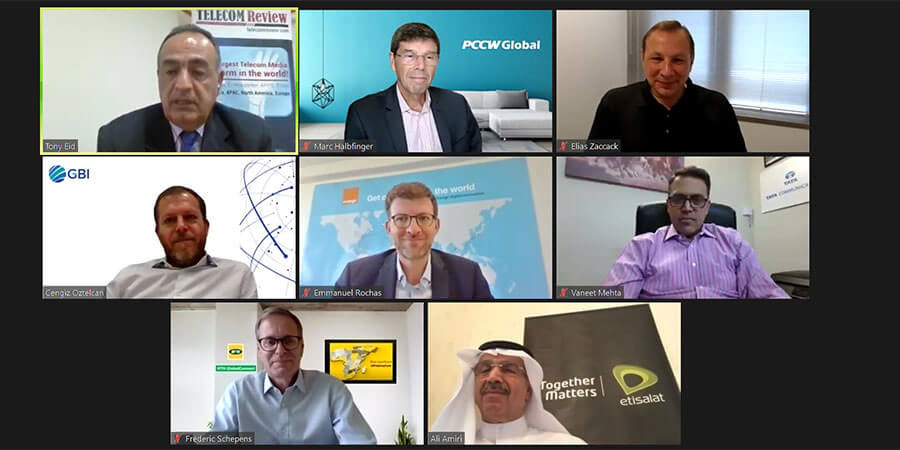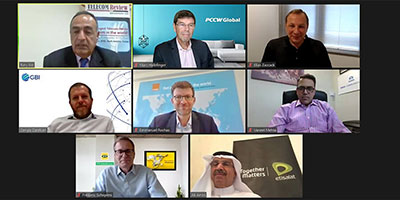
Telecom Review, the leading global telecoms news platform, held a virtual panel on 21 July, attended by 346 participants, to discuss the latest and most pressing issues in the wholesale and capacity space. Telecom Review mobilized an impressively unique panel with representatives from Etisalat, MTN GlobalConnect, PCCW Global, Tata Communications, SES, Orange and GBI.
Following the success of its previous virtual events, the panel titled, ‘Capacity and data traffic: Enabling a seamless experience’, was held at 16:00 UAE time on July 21st.
The session was moderated by Founder of Telecom Review and CEO of Trace Media, Toni Eid, and the panelists included: Ali Amiri, Group Chief Carrier & Wholesale Officer at Etisalat; Frederic Schepens, CEO of MTN GlobalConnect; Marc Halbfinger, CEO of PCCW Global; Vaneet Mehta, AVP & Region Head- MECAA at Tata Communications; Elias Zaccack, EVP of Global Sales at SES; Cengiz Oztelcan, CEO of GBI and Emmanual Rochas, CEO, International Carriers at Orange.
The globally renowned panelists discussed the management of the sheer amount of data which was generated throughout the COVID-19 pandemic, the role of the cloud in ensuring a seamless remote experience and the challenges that COVID-19 posed to the wholesale industry.
Ali Amiri, Group Chief Carrier & Wholesale Officer at Etisalat, said, “Organizations were less concerned about security and remote working because of cloud readiness. Everyone has to be cloud equipped and this showed during the pandemic. This was really quite important that people could connect from anywhere and from any device.”
Frederic Schepens, CEO of MTN GlobalConnect, stated, “When COVID-19 hit our operations, we already had more backups and strengthened networks. In certain markets, we saw 30-35% growth. Voice also increased because people were calling each other to make sure everyone was OK. As an industry, we can do a lot of good to make sure we support all these changes with a reliable, robust infrastructure and also ensure that we facilitate the digitization process.”
Marc Halbfinger, CEO of PCCW Global, said, “The one thing that I’m certain of as a result of COVID-19 is that I’m not certain of anything. The situation has made forecasting an art form. We need to consider as many possibilities as may exist. We don’t know when this issue will be resolved or how governments will deal with it. COVID-19 has demonstrated that anything that is driving new age automation is necessary.”
On the business Impact of COVID 19, Vaneet Mehta, Region Head, Tata Communications, mentioned, “In terms of wholesale segment, we had growth in data traffic, on account of OTT content consumption. But the enterprise segment saw decision making getting delayed.”
Vaneet, was still bullish on the enterprise segment, in markets like Saudi Arabia, UAE and certain select countries of Africa. He also touched upon the recent news of the recent Tata Communications local telecom license in the Kingdom of Saudi Arabia.
Elias Zaccack, EVP of Global Sales at SES, said, “Without dismissing the severity of COVID-19, we are seeing is a lot of opportunities. One of those opportunities is digitization. A lot of countries are moving a lot faster to digitization. What we have realized is just how essential satellites are to the global infrastructure.”
“For many years we’ve been talking about digitalization, we also learnt that most governments are nowhere near being digital especially during the lockdown. We suffered a lot of time wastage in terms of organizing basic processes. Also, security is currently in the back burner because people are just trying to be connected. It’s a good time for us to think about this, but the market will demand better security eventually,” commented Cengiz Oztelcan, CEO of GBI.
Emmanual Rochas, CEO, International Carriers at Orange, said, “This crisis has been dramatic in terms of human impact. It also had a massive impact on our international wholesale business. We have experienced a very strong shift in usage in terms of our businesses. Our networks have either been emptied or overloaded. We have seen an increase in domestic voice whilst international voice suffered. We had a very strong increase in public networks due to increase in consumption of entertainment.”







